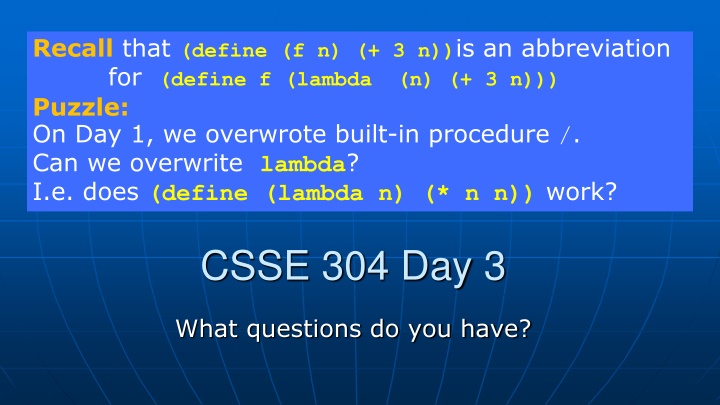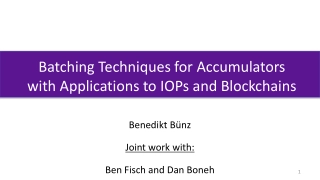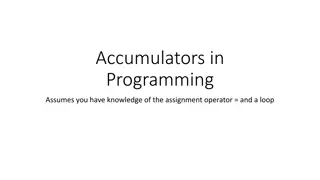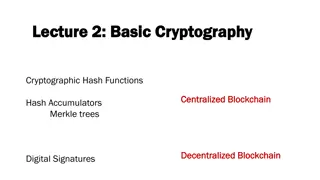
Scheme Procedures and Predicates
Dive into the world of Scheme programming, exploring topics such as overwriting procedures, lambda expressions, evaluating procedures and arguments, and understanding predicates like eq, equal, and eqv. Learn through examples and comparisons to improve your understanding of functional programming concepts.
Download Presentation

Please find below an Image/Link to download the presentation.
The content on the website is provided AS IS for your information and personal use only. It may not be sold, licensed, or shared on other websites without obtaining consent from the author. If you encounter any issues during the download, it is possible that the publisher has removed the file from their server.
You are allowed to download the files provided on this website for personal or commercial use, subject to the condition that they are used lawfully. All files are the property of their respective owners.
The content on the website is provided AS IS for your information and personal use only. It may not be sold, licensed, or shared on other websites without obtaining consent from the author.
E N D
Presentation Transcript
Recall that (define (f n) (+ 3 n))is an abbreviation for (define f (lambda (n) (+ 3 n))) Puzzle: On Day 1, we overwrote built-in procedure /. Can we overwrite lambda? I.e. does (define (lambda n) (* n n)) work? CSSE 304 Day 3 What questions do you have?
The similar example in Java Question from A0 hand-in https://en.wikipedia.org/wiki/String_interning
Need help on assignments? It's OK! What percentage of the class do I expect to solve most of the problems without talking to anyone else? 10 20 % I don't see learning as a solo activity If you don't have people to talk to, try the student assistants or me. For now! But also work on finding another student to work with. Do not copy other students' work! If you are stuck on a problem for more than a few minutes, talk to someone!
Go for Simple! Some students wrote (define first (lambda (x) (car x))) eta-reduction Simpler: (define first car)
Which is better? (cadr x) or (list-ref x 1)? (cadr x) or (car (cdr x)) ? Local define or let?
Recap - Predicates What's a predicate? How can you usually recognize that a given procedure is a predicate? eq? vs equal? eqv? From TSPL: eq? cannot be used to compare numbers and characters reliably. Although every inexact number is distinct from every exact number, two exact numbers, two inexact numbers, or two characters with the same value may or may not be identical (i.e., not eq?) eq? is cheaper than eqv?
What is common to all procedures? What is it that every procedure application always does? evaluates procedure and arguments first In which order? Not necessarily true of non-procedures. (quote x) ; x is not evaluated. (define x 3) ; x is not evaluated. (if x y z) ; either y or z is not evaluated. (or x y z) ;y and z may not be evaluated. (lambda (x) (+ x 3)) ; x is not evaluated.
fact example 1 > (trace fact fact2 fact-acc) (fact fact2 fact-acc) > (fact 4) |(fact 4) | (fact 3) | |(fact 2) | | (fact 1) | | |(fact 0) | | |1 | | 1 | |2 | 6 |24 24 > (define fact (lambda (n) (cond [(zero? n) 1] [else (* n (fact (- n 1)))]))) > (fact 4) 24 > (fact -2) C-c C-c break>q Escape from infinite loop by repeatedly pressing ctrl-c
Fact example 2 > (trace fact fact2 fact-acc) (fact fact2 fact-acc) > (fact2 4) |(fact2 4) |(fact-acc 4 1) |(fact-acc 3 4) |(fact-acc 2 12) |(fact-acc 1 24) |(fact-acc 0 24) |24 24 > (define fact2 (lambda (n) (if (or (negative? n) (not (integer? n))) "error" (fact-acc n 1)))) > (define fact-acc (lambda (n acc) (if (zero? n) acc (fact-acc (- n 1) (* n acc)))))
From the more recursive functions video: What if we want them in increasing order?
Translation of let (define L '(4 3 2)) (let ([first (car L)] [second (cadr L)]) (list (+ first second) (- first second))) The let expression is equivalent to ((lambda (first second) (list (+ first second) (- first second))) (car L) (cadr L)) examples of syntactic sugar , as are and and or. let and cond are both
more on let (define xxx (lambda (L) (let ([a (car L)] [b (cdr L)] [c (car b)]) (list c a)))) What goes wrong if we evaluate (xxx '(1 2 3)) ? Translate the let expression to an application of lambda one of the problems in A6 asks you to do the let application of lambda translation automatically.
let* What we really wanted was (define xxx (lambda (L) (let* ([a (car L)] [b (cdr L)] [c (car b)]) (list c a)))) which translates into (define xxx (lambda (L) (let ([a (car L)]) (let ([b (cdr L)]) (let ([c (car b)]) (list c a)))))) one of the problems in A6 asks you to do the let* nested lets translation automatically. Why not always use let* instead of let?
Work in small groups Introduce yourselves Work on these problems: (positives lon) returns a list of the positive numbers in lon. (positives '(3 -1 0 2 -5) (3 2) . (all-positive? lon) returns a boolean value. Note that positive? is a built-in procedure.








